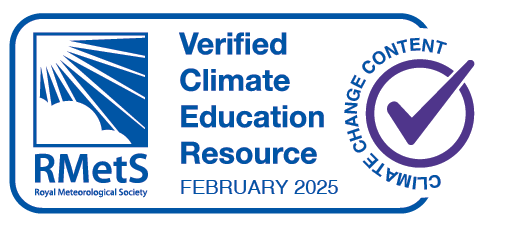Greenhouse gases: communication
It is important that any learning about greenhouse gases and climate change returns to the importance of people working hard together - as a school, local and global community - to reduce their carbon footprint and play a role in tackling climate change. This session showcases activities that allow learners to reflect on how they feel about climate and ecological issues, to support their wellbeing and sense of agency. This can also be an opportunity to celebrate the natural environment and how important it is to take care of it.
This is recommended as session six of the Key Stage Two Greenhouse Gases Unit, exploring the causes of climate change.

The RMetS climate change content tick is for the Science Museum group video.
Preparation
Green skills
- environmental stewardship
Step by step
Quick starter activity
What is climate change and what causes it? - Science Musem
Use this 2-minute Science Museum video to consolidate an understanding of the relationship between human activity and climate change, including that we all have a responsibility to work together to make positive change. Invite learners to share how they feel about the video.
Main suggested activities
Suggestion 1 (Indoor)
The Poetry Society: Renewable poetry. This poetry-based activity supports learners to articulate their feelings about greenhouse gas emissions and respond through creative poetry writing.
*While poetry activities link with the English curriculum, if this activity is being used within another subject area, it can be used for discussion and reflection, rather than the assessment of writing.
Suggestion 2 (Outdoor)
National Education Nature Park: Write a vision statement. This activity provides a range of strategies for learners to create a vision about what they would like to see in their outdoor space. Conduct this activity with a focus on habitats.
Suggestion 3 (Outdoor)
National Education Nature Park: Ideas for improvement. This activity is part of the Nature Park process and it can also be used to support learners to think about what actions will improve school grounds for biodiversity and provide nature-based solutions to climate change.
Top tips
It is important that learners recognise that local and international decision-makers are also acting to reduce carbon emissions by introducing targets and policies that support businesses, schools and people.
Curriculum links
KS2
Developing confidence and responsibility and making the most of their abilities
Preparing to play an active role as citizens
Developing good relationships and respecting the differences between people
